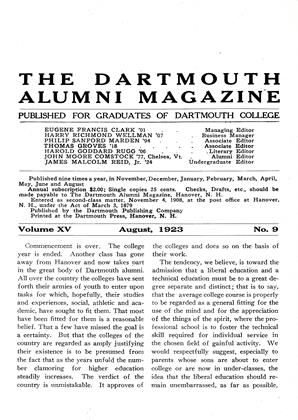One of the most interesting of recent pronouncements by the Harding administration in connection with foreign policy was the address of Secretary of State Charles Evans Hughes delivered at the Alumni Luncheon in Alumni Gymnasium on Commencement day following Dartmouth's award to the Secretary of the Honorary degree of Doctor of Laws. At that time Secretary Hughes said:
"The permanent Court of International Justice constitutes a tribunal with standards 'that conform to our highest courts.' "
Mr. Hughes said "that the United States could today with greater satisfaction submit to disputes to which it is a party to his court than to any arbitral tribunal it would be possible to set up."
Mr. Hughes applauded "the increasing interest in foreign peoples and our relations with them," now evident in the United States, but said that if this interest was not to serve "merely to promote the constant endeavors of propagandists or of racial groaps ... it must have its support in a careful study of history and the understanding of other nations and their conditions which the colleges should provide."
"In our foreign relations we desire peace, .security and co-operation," said the Secretary. "Would that the spirit of America had one voice, one message. But there is a babel of voices, a confusion of tongues. If danger threatens us, we happily stand united; but when we are least concerned as to our own safety we are most divided in our counsels. But allowing for all the inevitable differences, is it too much to expect that we should have one controlling voice, one dominant message as to the fundamentals? We are intent on peace, and because of this the United States can never refuse its support to institutions of justice.
"We recognize that there are two classes of controversies which may lead to strife. There are the conflicts of national interest; of political expediency, of rival policies where there is no agreement, no recognized determining principle, no governing rule of law which may be invoked. Here we are bound to recognize the rights of other States, equal members of the family of nations, as we unfailing insist upon our own. It was said by one of our great statesmen that the foreign policy of the United States may be described as the Monroe Doctrine and. the Golden Rule. We,shall achieve our highest aims of helpfulness when we think as much of the latter as we properly think of the former.
"Helpfulness is ,not meddlesomeness, and does not consist in attempts to intrude uninvited decisions in controversies that are not ours. Our friendly offers are always available'when they are welcome and can properly be given, but, it must be remembered that friendship is to continue.
"But in the class of controversies where there are treaties to carry out, and commonly accepted principles and rules of international law to apply, we have a manifest duty. That duty is to maintain the sanctity of international engagements; to aid in securing the impartial adjustment of differences, and thus to insure the adequate administration of international justice.
"But we shall do but lip-service to this cause if we refrain from supporting the agencies of justice. It happens that at this time there exists, is functioning, a permanent court of international justice, equipped with a permanent body of jurists as well qualified for their task as any judges that could be chosen—men whose character and equipment permits no charge of partiality or disqualification. They constitute an independent tribunal with the standards, the tenure of office and the equipment that conform to the standards of our highest courts. In truth, they constitute in fact as well as in name an actual court of justice.
"There is no path to the millennium other than the path of justice, and if we discard the best attainable instrumentalities of justice, to that extent we invite the decisions of the sword. The true method of promoting inter- national accord is to seek to avert the clash of interests by agreement and to have agreements fairly interpreted and carried out."
 View Full Issue
View Full Issue
More From This Issue
-
 Article
ArticleTHE REJOINDER OF JOAN
August 1923 By EDWIN J. BARTLETT '72 -
 Article
ArticleCommencement is over. The college year is ended.
August 1923 -
 Article
ArticleCOMMENCEMENT 1923
August 1923 By WILLIAM H. MCCARTER, 1919 -
 Article
ArticleCOLLEGE STUDENTS AND THE AVERAGE AGE
August 1923 By RICHARD WELLINGTON HUSBAND -
 Class Notes
Class NotesCLASS OF 1903
August 1923 By P.E. WHELDEN -
 Class Notes
Class NotesCLASS OF 1911
August 1923 By Prof. Nathaniel G. Burleigh








